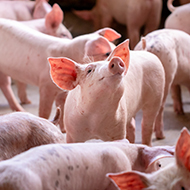Algorithm created to reveal pig emotion

(Caption here)
A study from an international team of researchers has designed an algorithm to decode whether an individual pig is experiencing a positive or negative emotion, depending on its grunts.
The researchers, from Denmark, Switzerland, France, Germany, Norway and the Czech Republic, used over 7000 audio recordings of pigs, taken in both commercial and experimental scenarios, to develop the algorithm.
Positive recordings were captured in situations such as when piglets suckled from their mothers, or when they were united with their family after being separated. Negative recordings were captured in situations including separation, fights between piglets, castration and slaughter.
Researchers also created a variety of mock scenarios for the pigs, which were designed to evoke nuanced emotions, including an arena with toys or food, and a corresponding arena without stimuli.
Analysing the recordings taken, the researchers discovered that more high-frequency calls were collected in negative situations, whereas low-frequency calls occurred in situations were the pigs experienced both positive and negative emotions.
It was also discovered that the pigs' vocalisations were far shorter, with minor fluctuations in amplitude in positive situations.
Associate professor Elodie Briefer, from the University of Copenhagen, explained: "With this study, we demonstrate that animal sounds provide great insight into their emotions.
“We also prove that an algorithm can be used to decode and understand the emotions of pigs, which is an important step towards improved animal welfare for livestock.
“By training an algorithm to recognize these sounds, we can classify 92% of the calls to the correct emotion.”
The research team believe that the algorithm created could be useful for monitoring livestock and ensuring pig welfare.
“We have trained the algorithm to decode pig grunts. Now, we need someone who wants to develop the algorithm into an app that farmers can use to improve the welfare of their animals,” Elodie added.
Published in Scientific Reports, the study is available to read here.



 The Veterinary Medicines Directorate (VMD) is inviting applications from veterinary students to attend a one-week extramural studies (EMS) placement in July 2026.
The Veterinary Medicines Directorate (VMD) is inviting applications from veterinary students to attend a one-week extramural studies (EMS) placement in July 2026.